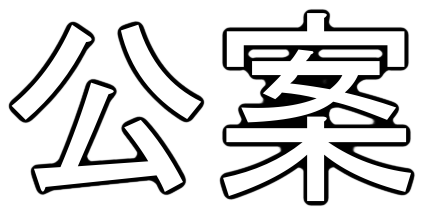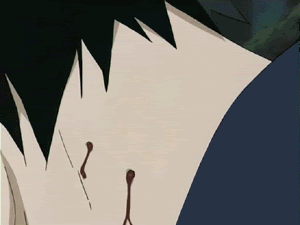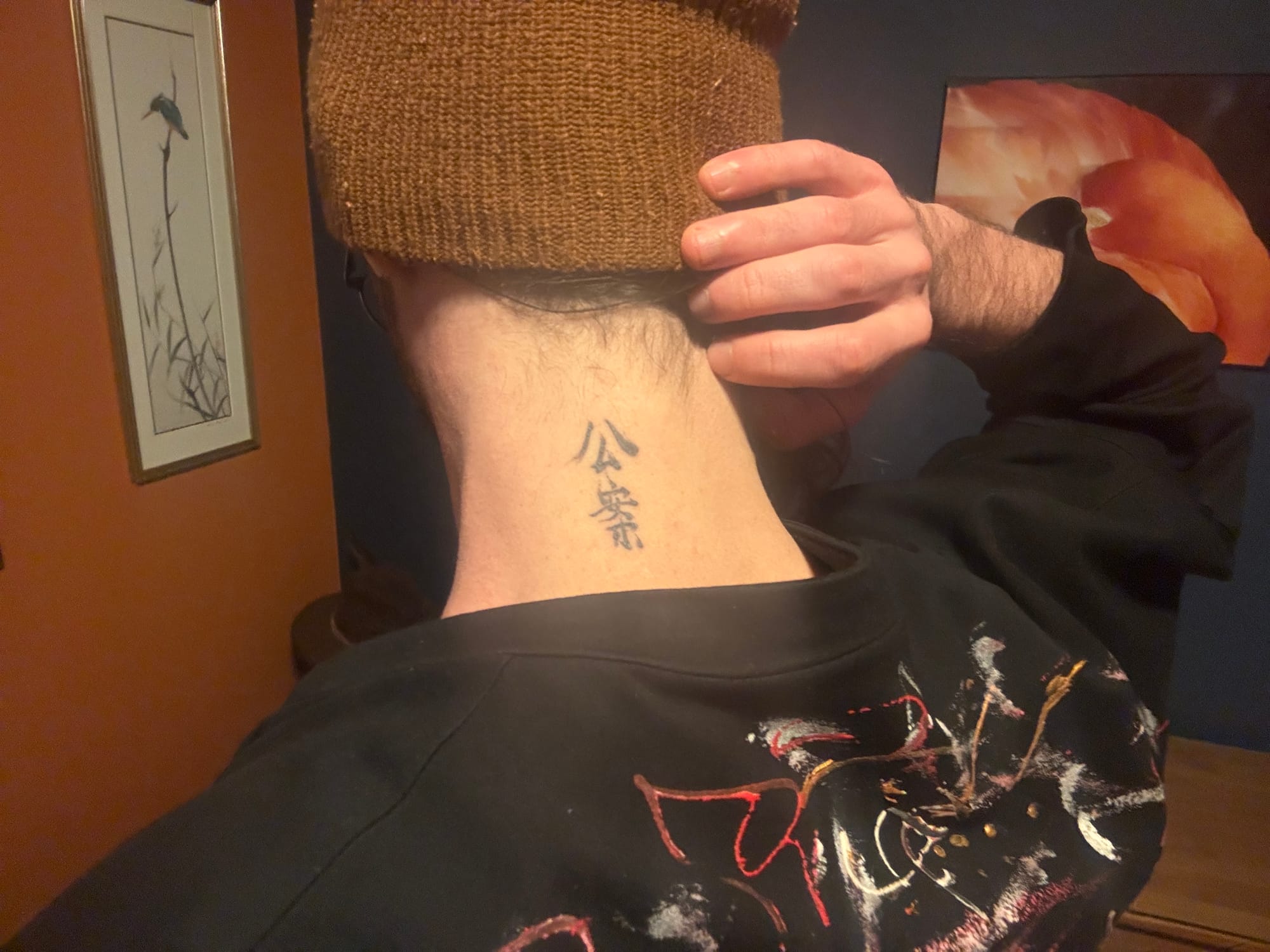The Invisible Koan.

I spent 2 hours last week etching the word koan into the back of my neck…
No, but, for real. It’s healed now, so I'm happy to share that I got a tattoo.
The two kanji that make up the word KOAN.

Let’s talk about what & why. 😄
“I believe life is a Zen koan, that is, an unsolvable riddle. But the contemplation of that riddle - even though it cannot be solved - is, in itself, transformative. And if the contemplation is of high enough quality, you can merge with the divine.” — Tom Robbins
The short part of a long answer? It's important enough that I felt compelled to codify it in blood, sweat, and ink on my body.
Tattooing is ritual embodiment—a commitment filled with pain, purpose, and patience; a declaration of deep importance.
Doing My Homework.
I was 2.5 weeks into a medicine container last November—aya ceremony number 10, something like that. My previous ceremonies had been heavily Zen/Koan-themed… later birthing gems like Courting the Muse, Cracking the Koans, Gentle Violence, and Natural Anarchy.
The medicine had me tapping out again, forcing my rational mind into submission against an overwhelming opponent, when a deep moment of clarity (& pain) arose.

My neck began to burn. It hurt, like someone was carving into me with a dull pen. Akin to the appearance of Sasuke’s mark. And with all the self-evident, pre-verbal clarity that medicine experiences provide, I knew it was KOAN etching itself into me.
So in a way, I was just doing my homework. The medicine gave me an assignment, and you best believe I’m going to do it. Crossed it off my list and everything. 🤓
The Wild World of Koans.
- Two hands clap and there is a sound. What is the sound of one hand?
- If you meet the Buddha on the road, kill him.
- Without thinking of good or evil, show me your original face before your mother and father were born.
- [Your Name Here].
- What am I capable of?
All of these are koans…
Koans tie the mind up in knots. They force it into submission by pursuing an impossible task. Renowned teacher Philip Kapleau has a great framing,
"...a koan is 'unsurpassed for breaking asunder the mind of ignorance and opening the eye of truth.'"
Koans in practice can take weeks, months, or even years of wrestling with. They instigate 'Great Doubt' – a pivotal aim in Zen. Doubt of the capability of mind, your worldview, understanding, and capacity.
A possibility opens at the moment of final surrender: the answer can finally come from somewhere else.
But where else could the answer come from? Well, the great wisdom of your body, for one. The part of you always in nondualistic harmony with everything.
It is this instinctual wisdom that Zen & Koan practices are after.
All ‘answers’ to koans are genuine acts. They are not fancy responses in well-thought-out language. They are authentic, immediate experiences. Demonstrating embodied wisdom, not remarking on intellectual understanding.
And true to Zen's rascal nature… these infamous ‘unsolvable riddles’ have real answers. Wrap your head around that one…
For aspiring monks in koan practice, every koan has a ‘real answer’. The jakugo.
Jakugo are ‘proof of insight’ for a koan. They are not the solution itself (all answers are experiential insights and authentic acts), but they are ‘capping phrases’ — a proof of solution, matching the insight to a complementary piece of Chinese poetry. There are specific jakugo 'appropriate' for each koan.
As the koan rips you open to an authentic realization of your original nature, you have an insight (kensho). Your task is to review the snippets of poetry (jakugo) and select the one that best matches the particular insight.
I cannot properly express how much I love this.
I realize now that I wrote recently about poetry being the Zen Bible. And here it is: poetry, delivered in genuine expression, as the answers to unsolvable riddles. Poetic.
It’s easy for us to discard koans as silly playthings—not to be taken seriously. They’re ‘unsolvable’, so ‘anything goes’ and you just have to say something sufficiently stupid.
Not at all.
In the early developments of koan practice, they were categorized into 3 groups: richi (ultimate truth), kikan (skillful method), and kojyon (non-attachment). All koans are trying to teach you something about the nature of reality and who you are. Each koan has its accompanying jakugo. It’s not random.
- Names are koans. You can’t ‘solve’ a person. But there is a right relationship with them. There are genuine, authentic, instinctual acts that are in harmony with the nature of things.
- Great life questions are koans. How should I live? What am I capable of? These don’t have final, static, stuffy answers. The answers are lived, through genuine acts in reality. But there are real answers.
When you orient toward your highest possible self, for any and every question in life, there is only one right answer: the action your highest possible self would take. Duh? A genuine, embodied act from your Buddha-nature, your deepest wisdom, your greatest courage.
Unsolvable riddles with clear answers.
There’s something I find particularly apropos about having a tattoo that I cannot see. Just as you cannot bite your teeth or see your own face, I cannot see the tattoo I know I have.
Only the Best.
What draws me to Zen and Koans is this: there is only one way to know that you really, truly, honestly, are not capable of something—you must give it your best shot.
If it’s anything less than your best, there’s room for doubt and excuses. You have to know, in every fibre of your being, that you... failed (or succeeded).
Think of your high school exams (and yes, the direct translation of koan is ‘public exam’ or ‘official case’). You could always tell yourself, “I would’ve done better if I had eaten more, studied harder, actually cared, didn’t miss the bus, wasn’t distracted, really tried.”
Endless excuses protecting a fickle ego.
The only real way to give your absolute best? Become your absolute best. Live it in every waking moment. Make it your Way of Being.
This is Zen.
Zen is not wishy-washy half-assed nonsense, nor are koans stupid games from a pompous high-and-mighty priest class.
They demand you become the smartest, strongest, wisest, most capable version of yourself, and then they still wreck you. Happily and without hesitation, submitting you at the bleeding edge of your capacity.
For only in those moments where you are beaten—truly humbled—can you get on your knees and openly receive the profound wisdom of your life, body, and buddha-nature. Only when you're empty can your cup be filled with something new.
This is the power and potential of Zen Koans.
This is what I never wish to forget.
This is why I etched it, in blood and ink, into me.

So a silly fool like me might never forget: there are no right answers, only right actions.
Thank you for listening :)
EB.
No spam, no sharing to third party. Only you and me.
